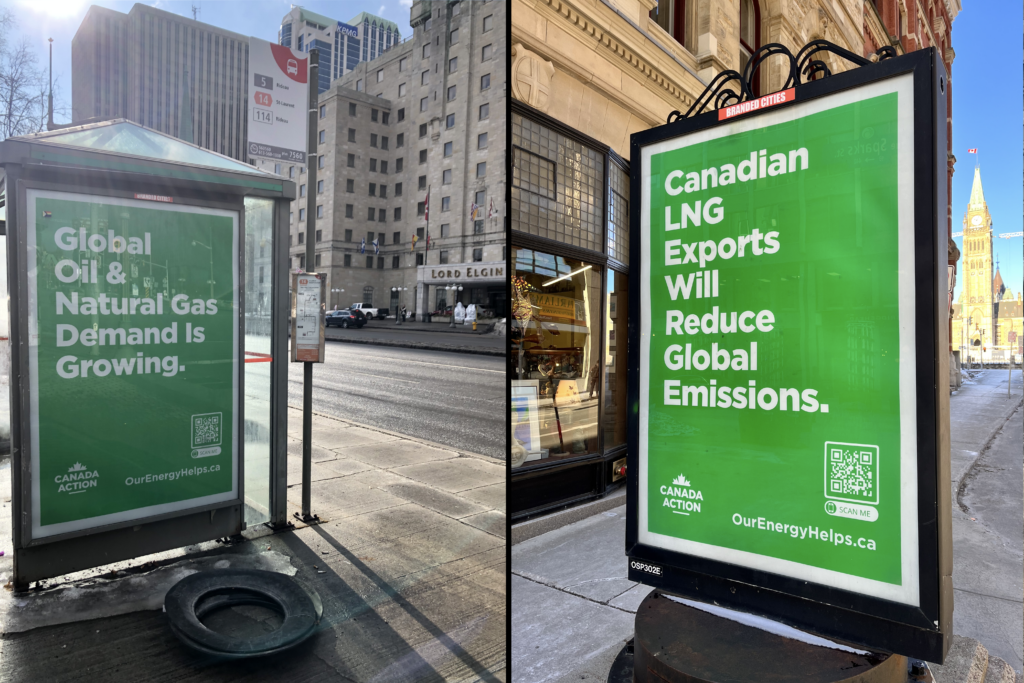The city of Toronto has passed a motion aiming to restrict fossil fuel advertising on municipal property, one of several recent efforts to curtail fossil fuel advertising in major Canadian cities. The motion passed on Thursday, October 10, giving Toronto city councillors one year to come up with a draft of the proposed legislation.
The effort comes as transit agencies in Canada’s two largest cities have either implemented or are considering similar restrictions on using public transit to advertise for Big Oil or related industries. Montreal’s transit agency, the Société de transport de Montréal (STM), has indicated that they intend to ban misleading fossil fuel advertising. Toronto’s proposal would potentially remain open to ads that align with the city’s net zero goals and don’t run afoul of new federal anti-greenwashing regulations.
In September, DeSmog reported that Toronto City Councillor Dianne Saxe had introduced a motion proposing to restrict false and misleading advertising from oil and gas lobby groups on public transit. The motion did not advocate for a full ban on all fossil fuel ads.
Subscribe to our newsletter
Stay up to date with DeSmog news and alerts
“Toronto’s decision to limit fossil fuel advertising is a landmark win for public health and climate action,” said Dr. Melissa Lem in a statement. Lem is a family physician and President of the Canadian Association of Physicians for the Environment (CAPE).
“As physicians, we’ve long recognized that fossil fuel pollution, like tobacco smoke, poses severe health risks to our communities — especially to children and other vulnerable populations,” said Lem.
Misleading Ads in Motion
The new limits come on the heels of federal anti-greenwashing regulations aiming to stem the tide of misinformation produced by Canada’s fossil fuel sector and their lobbyists. They also follow a series of high-profile advertising campaigns launched by the oil and gas industry. Pathways Alliance, a consortia of Canadian tar sands producers, has been the most visible, with a comprehensive media blitz involving traditional print and broadcast advertising, advertorials, sponsorship, and the use of public transit infrastructure — including buses and streetcars — that suggest they are taking an active role in emissions reductions.
In fact, the Pathways Alliance is principally interested in developing a $16.5 billion carbon capture and sequestration project, as well as a 400-kilometer carbon dioxide pipeline to serve about 20 different tar sands production facilities. Critics of the project, and carbon capture more broadly, argue that carbon capture overpromises and consistently under-delivers on its alleged environmental advantages. DeSmog previously reported that Pathways paid Google to redirect web searches on environmental and climate change topics to its website, and further paid Google to redirect web searches specifically on the subject of greenwashing. When new anti-greenwashing regulations came into effect in Canada earlier this year, Pathways removed all content from their website.
Toronto councillor Saxe specifically mentioned both Pathways Alliance and Canada Proud as two lobby groups the Toronto Transit Commission (TTC) should cease advertising.
In reaction to Pathways’ “let’s clear the air” campaign, three Canadian environmental groups complained to the Competition Bureau in the spring of 2023, arguing that the campaign was misleading the public. The Competition Bureau, an independent Canadian law enforcement agency tasked with protecting consumers and promoting competition, agreed to launch a still-ongoing investigation.

In August 2023, DeSmog reported that Montreal’s bike share program, Bixi, had decided to pull ads for the Pathways Alliance. Pathways had also been advertising on Montreal bus shelters at the time, as well as using buses in Vancouver and streetcars in Toronto as mobile billboards. They featured slogans such as “our net zero plan is in motion.”
In late 2023 and early 2024, ad campaigns by the Canadian Association of Petroleum Producers (CAPP), and Canada Proud (an allegedly grassroots pro-oil lobby group), were spotted on public buildings throughout the Canadian capital of Ottawa. Ads by these groups have promoted claims Canadian oil and gas resources are either in high demand or will reduce global emissions. This high-profile campaign, in addition to the campaign by Pathways Alliance, led various environmental groups in Ottawa to propose similar bans on fossil fuel advertising as much as inspiring the federal anti-greenwashing regulations. Ad Standards Canada later determined that some of those Ottawa ads by Canada Action, particularly those that argued Canadian LNG exports would reduce emissions globally, were misleading and amounted to greenwashing.
‘Powerful Precedent’
Pressure to crack down on fossil fuel advocacy advertising and greenwashing has been ramping up steadily over the past year in Canada. In February, DeSmog reported that long-serving Member of Parliament Charlie Angus proposed a private member’s bill that would ban misleading fossil fuel advertising. Angus’ proposal was in response to the aforementioned ad campaigns by Pathways and Canada Action. His proposal was further modeled on anti-tobacco advertising legislation passed in Canada in the 1990s. That proposal wasn’t passed, but resulted in fossil fuel advocates spreading misinformation about it. Angus’ office was subsequently inundated with death threats.
In June, bill C-59 — another government effort to crack down on greenwashing — became law. Though mischaracterized as a ban on fossil fuel advertising, the new regulations in fact require environmental claims to be backed up with evidence. This prompted tar sands producers and industry lobbyists to scrub content from their websites, including their own environmental goals.
Oil advocates, including the former and current environment ministers of the Canadian province of Alberta, continue spreading misinformation that the anti-greenwashing laws are part of a broad conspiracy to silence the fossil fuel sector.
“This bold move signals the end of unchecked fossil fuel advertising and positions Toronto at the forefront of a global shift,” CAPE’s Dr. Lem said of the Montreal and Toronto developments.
“Toronto is clearing the air of both pollution and misleading propaganda, setting a powerful precedent for cities nationwide and globally, moving us toward a healthier, more sustainable future for all people in Canada.”
Subscribe to our newsletter
Stay up to date with DeSmog news and alerts






